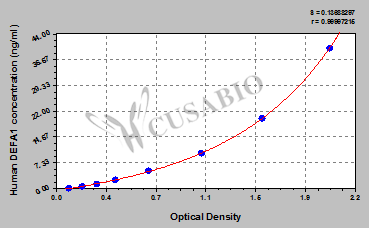Defensin alpha 1 (DEFA1) is an antimicrobial peptide belonging to the alpha-defensin family, primarily produced by neutrophils and Paneth cells in the small intestine. This cationic peptide functions in innate immunity by disrupting microbial cell membranes and showing broad-spectrum antimicrobial activity against bacteria, fungi, and enveloped viruses. DEFA1 is stored in neutrophil granules and released upon activation, contributing to the first line of defense against pathogens. Research has linked DEFA1 to various inflammatory conditions and immune responses, making it an important biomarker for studying innate immunity and host-pathogen interactions.
The Human defensin, alpha 1 (DEFA1) ELISA kit (CSB-E14155h) is a quantitative sandwich assay designed for measuring DEFA1 levels in human serum, plasma, and urine samples. The kit has a detection range of 0.625 ng/mL to 40 ng/mL with a sensitivity of 0.156 ng/mL. The assay requires 50-100 μL sample volume and can be completed within 1-5 hours. Detection occurs at 450 nm wavelength. This provides researchers with a reliable tool for quantifying this antimicrobial peptide in various biological specimens.
Application Examples
Note: The following application examples are drawn from a selection of publications citing this product. For additional applications, please refer to the full list of references in the "Citations" section.
This ELISA kit has been used in clinical research studies to quantify defensin alpha 1 levels in human biological samples. The kit supports comparative analyses between patient populations and healthy controls, as well as biomarker validation studies in cardiovascular and infectious disease research.
• Cardiovascular research: Used to validate defensin alpha 1 as a potential biomarker in acute myocardial infarction studies, comparing plasma levels between patients and healthy controls
• Infectious disease studies: Applied in COVID-19 research to measure serum defensin alpha 1 concentrations and assess differences between infected patients and control groups
• Biomarker validation: Used in multi-protein panels to confirm proteomic findings and validate differentially expressed proteins identified through discovery-phase analyses
• Clinical sample analysis: Supports quantitative measurement of defensin alpha 1 in human serum and plasma samples for disease-related biomarker studies






